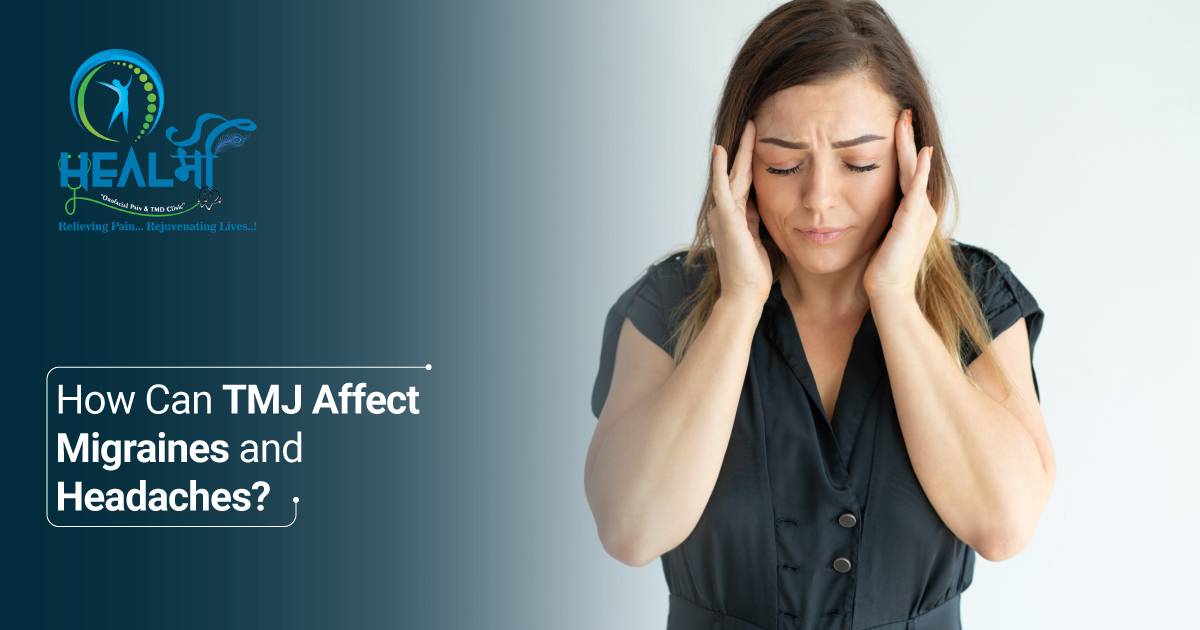How Can TMJ Affect Migraines and Headaches?
Home
How Can TMJ Affect Migraines and Headaches?

Home
How Can TMJ Affect Migraines and Headaches?


Whenever you suffer from migraines or headaches, it is a pounding question that arises that triggers such problems.
To your surprise, it is a fact that your jaw might be a problem to a wide extent. TMJ, or temporomandibular joint disorder, affects the joint that connects the jaw to your skull. An effect of the same can cause pain in various parts of your head that can lead to a situation of headaches and migraines. In the following blog, our experts in TMJ Treatment in Ahmedabad will help you dive deeper into How Can TMJ Affect Migraines and Headaches.
The temporomandibular joint is a small joint, but it is of great importance that lets you open and close your mouth. It helps in basic functions like talking, chewing, etc. If in case this joint is not working right, it can affect the muscles and nerves in your face, head, and neck. Furthermore, it triggers headaches and migraines, leading to more pain.
The jaw does not work alone, but it is integrated with various other parts. Thus, a problem in one can affect many other nerves also.
Talking about TMJ and headaches is mainly about the connection between muscles and nerves. TMJ affects the muscles that control your jaw movements, and these muscles are directly linked to the head and neck. This network of muscles and nerves means that when the jaw is in pain, your head suffers.
In addition to tension in the muscle, TMJ can cause issues like teeth-grinding. Grinding puts more stress on the jaw muscles, which leads to inflammation and irritation of the nerves around the jaw joint. This irritation can send pain signals to the brain, triggering headaches.
Understanding the connection
Understanding the link between TMJ and headaches is important because treating one condition helps deal with future uncertainty. Many people who suffer from chronic migraines or frequent headaches do not realize that their jaw could be contributing to their pain. By understanding TMJ, you can get to a solution soon.
Ignoring the symptoms of TMJ can worsen headaches over time. That is why paying attention to jaw pain or discomfort, especially if you regularly experience headaches, can be a step toward finding relief. Our experts also help you counsel on The Impact of Migraines on Mental Health so that you can know the severity of your problem.
Firstly, make it clear that TMJ headaches and migraines are two different conditions but might feel similar and can lead to confusion.
A TMJ headache is often linked to jaw movement, and migraines are a more complex neurological condition. However, both of these can cause discomfort, and thus, recognising the difference is key to getting the right treatment.
| INDEX | TMJ HEADACHES | TMJ MIGRAINES |
|---|---|---|
| LOCATION OF PAIN | TMJ Headaches occur around the jaw. | TMJ Migraines are often one-sided and can be located anywhere on the head. |
| TYPE OF PAIN | TMJ Headaches feel more like a dull ache or sharp pain. | TMJ Migraines have a throbbing or pounding sensation. |
| SYMPTOMS | TMJ Headaches, on the other hand, don’t usually come with these symptoms. | Sensitivity to light, sound, or smells, and nausea or vomiting. |
| TIME OF ONSET | TMJ Headaches are often worse in the mornings due to nighttime teeth clenching. | TMJ Migraines can appear at any time of the day. |
You need to understand that you need to treat the cause and not just the problem you are going through.
TMJ headache Treatment involves issues related to stress relief on the jaw and muscles.
The decision of what you eat today will affect how you will feel tomorrow.
Maintaining a diet is an essential step in both TMJ headaches and migraines. Some foods and drinks can trigger headaches. Common triggers include :
A calm mind can help reduce headaches to a great extent.
Stress is one of the major triggers for both TMJ headaches and migraines. By managing stress, you can prevent various conditions and even reduce it till it gets worse.
Lastly, taking care of the overall body and health for managing TMJ headaches and migraines is essential for better health in the future.
Our experts at Orofacial Pain & TMD Clinic are renowned TMJ and orofacial pain specialists based in Ahmedabad. Our team is known for treating TMJ disorders and TMJ headaches. With years of experience in the field, we have become a leading provider of innovative treatments such as injections, Botox, and oral appliances to alleviate pain and improve jaw function.
We do not just treat symptoms we address the root cause.